Zhihu reported its earnings for the second quarter of 2025 on August 27, marking the company’s third consecutive quarter of non-GAAP profitability.
According to the filing, Zhihu turned a profit in the first half of the year under both GAAP and non-GAAP standards. For Q2, the knowledge sharing platform posted revenue of RMB 717 million (USD 100.1 million) and an adjusted net profit of RMB 91.3 million (USD 12.8 million). Gross margin reached 62.5%, and the company reported 13.2 million monthly subscription members.
Zhihu is listed on the New York Stock Exchange (NYSE) and the Hong Kong Stock Exchange (HKEX), trading under the ticker symbols ZH and 2390, respectively.
The results offer a counterpoint to a longstanding belief in China’s internet sector: that platforms built on user-generated content and expertise must burn through capital in pursuit of growth. Zhihu’s performance suggests a different path is possible, one that prizes professional exchange while still generating profits.
Even so, founder and CEO Zhou Yuan remained composed.
In a late August interview with KrASIA, Zhou emphasized that the profits were not the result of cutting costs alone. Instead, he credited a balanced mix of revenue from subscriptions, marketing services, and vocational education. Zhihu, he said, has remained focused on fostering meaningful, professional interactions while also increasing its commercial value.
Beneath Zhou’s composed tone lies a seemingly larger ambition. Zhihu appears to be entering a new phase, one where its core identity is up for redefinition. For investors, the key question now is what comes next for a Chinese-language platform rooted in trust and subject matter expertise, particularly in an era reshaped by artificial intelligence.
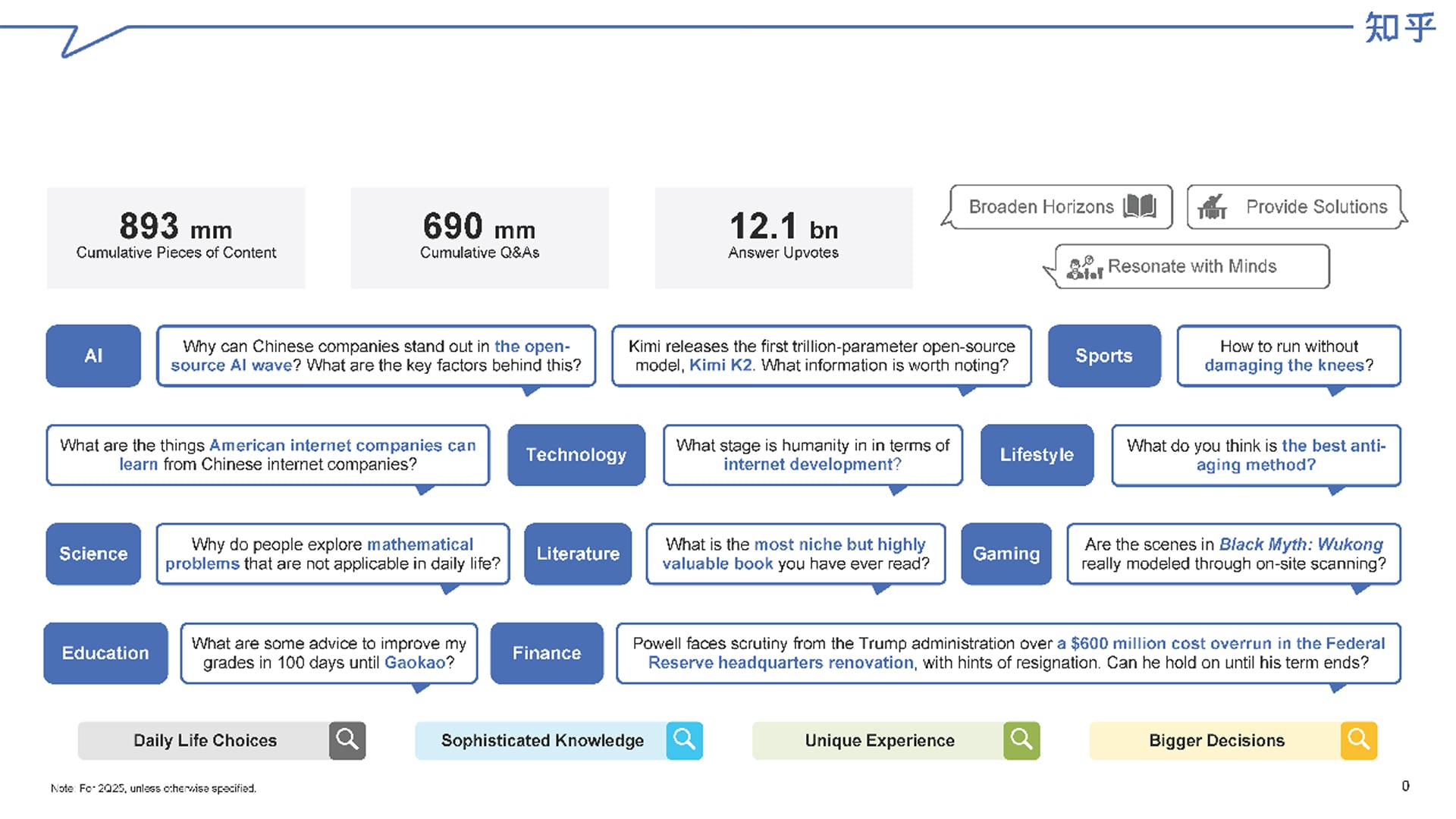
The following transcript has been edited and consolidated for brevity and clarity.
Profitability as ballast, not chance
KrASIA: Zhihu has been profitable for three quarters now. How important is it for the company to maintain that trajectory?
Zhou Yuan (ZY): Sustained profitability is very important. It shields us from short-term market sentiment and keeps us from straying off course just to satisfy near-term metrics. Even if the market turns volatile, that profitability gives us stability and becomes the ballast for long-term planning.
KrASIA: Chinese internet firms tend to thrive on traffic-driven strategies, while Zhihu is trying to prove a different path. Was getting here more about luck or inevitability?
ZY: In the early years of the mobile internet era, prioritizing scale was the dominant strategy. Everyone thought that if you grew big enough, commercial possibilities would follow. But Zhihu never aimed to compete in the traffic lane. While the internet was trending toward fragmented, entertainment-driven content, we focused on an overlooked group: educated professionals whose expertise was undervalued.
So I wouldn’t call it luck alone. On one hand, the number of Chinese university graduates has continued to rise. They need a platform to turn professional expertise into social capital. On the other, demand for trusted content was bound to grow. Both are industry trends we expected.
Luck plays a role, but discipline matters more. We refused to accept low-quality content for the sake of boosting traffic, explored diverse monetization models around knowledge products and services, and relied on refined operations. These choices, not chance, led us here.
Trust as the cornerstone
KrASIA: Zhihu defines itself as a community built on trusted content and expertise. If you had to describe its core value with one English word, what would it be?
ZY: Trust. It’s not just the community’s foundation. It’s also our team’s core value.
KrASIA: Has safeguarding that trust ever led you to turn down business opportunities?
ZY: We’ve passed up plenty of short-term gains. For instance, during the boom in entertainment-driven and video-heavy formats, we experimented briefly but quickly realized those trends didn’t support long-term community health. We adjusted course decisively.
In advertising, we cut a significant number of low-quality ads that could harm the community, even at the cost of short-term revenue.
And in AI, we categorically refuse to let AI-generated content masquerade as human. If fake voices flood the platform, trust evaporates, and real users leave. That would destroy long-term value.
Looking back, these were the right calls. They protected Zhihu’s core value.
Growth that compounds, not just scales
KrASIA: You’ve said before that some types of growth are “bad for Zhihu.” What do you mean?
ZY: Growth isn’t just about getting bigger, but also creating more value. Does the platform benefit both users and creators? Does it strengthen the ecosystem?
The early bike-sharing boom illustrates what happens when growth overlooks value. Companies chased scale by flooding cities with bicycles, which led to low usage, damaged equipment, and mounting waste. Expansion without value carries social costs.
At Zhihu, growth has never been defined solely by user counts or session length. From the beginning, we believed that combining high-quality content with expert networks would deliver sustainable returns. Even when we experimented with traffic-driven strategies, we quickly pulled back.
AI’s rise underscores this distinction. The mobile internet era equated value with user numbers, treating headcount as a proxy for success. AI operates differently, asking instead whether it improves human life. The worth of ChatGPT, for instance, lies not in the number of accounts created but in the quality of its outputs. That is the kind of growth that matters.
KrASIA: But isn’t this path slower? Doesn’t that make Zhihu a “small but beautiful” story?
ZY: I would not call it “small.” But yes, it is a long runway. What we aim for is not rapid growth in scale, but compounding growth in value.
I once watched an aerospace researcher solve a PhD-level problem using insights found on Zhihu, then return to share expertise with others. That is cumulative value. It grows slowly but endures.
Our creators do not rely on fleeting viral moments. They spend years building trust in their fields, gradually becoming recognized experts. This sustained investment is why they remain with Zhihu.
Zhihu’s content carries two distinct qualities. First, it is durable: users can revisit it long after publication, unlike short videos that algorithms quickly phase out. Second, it is renewed by creators who update and expand their work, keeping it relevant. Together, these qualities form a cycle of altruism and self-benefit. Sharing knowledge helps others while sharpening the creator’s own thinking.
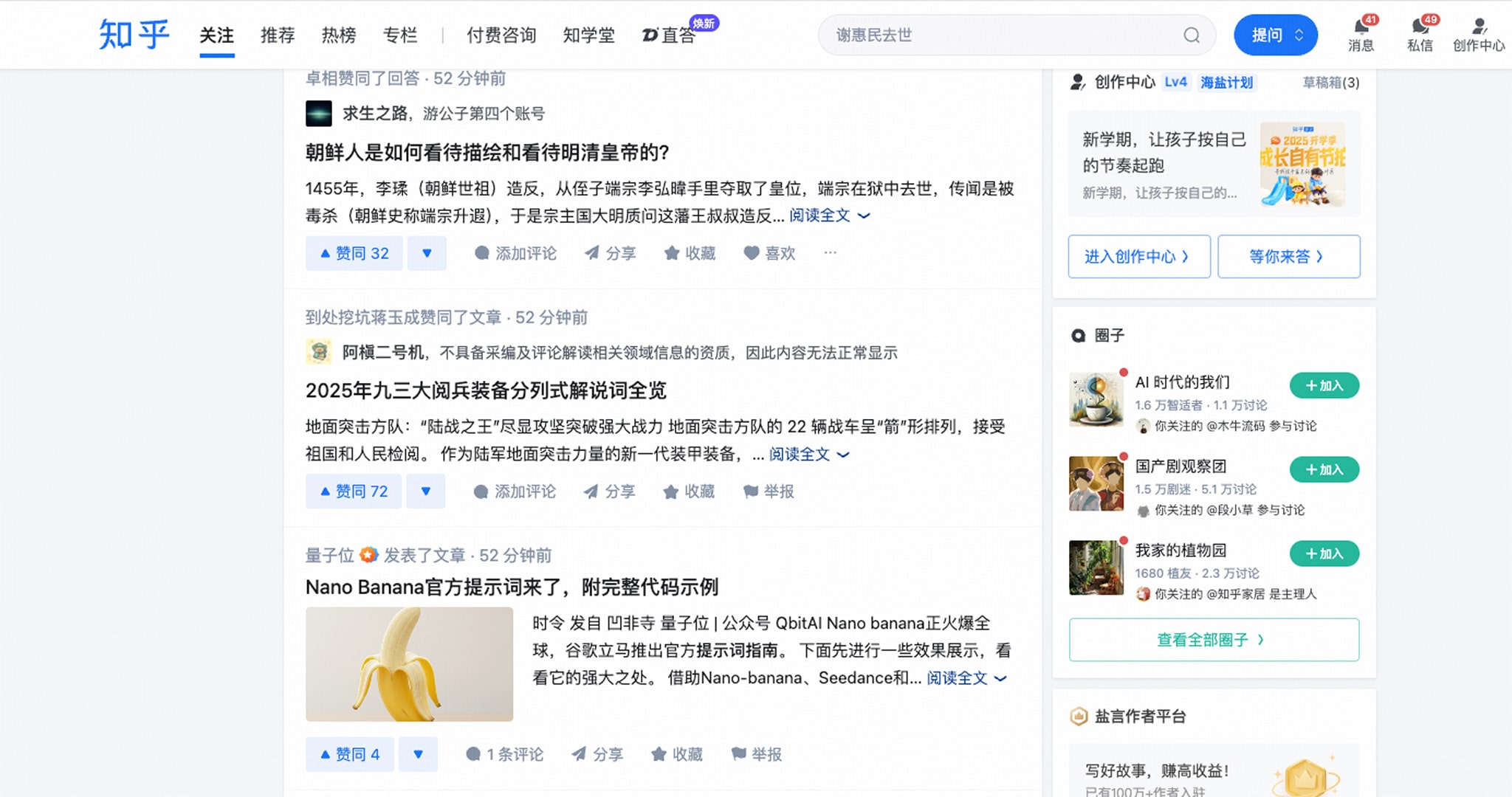
Stories, services, and training
KrASIA: Some argue that subscription products like Yanyan Stories or paid memberships dilute Zhihu’s identity. How do you respond?
ZY: Zhihu has always been, and will remain, a place for professional, authentic, and in-depth exchange. That will not change. But users have broader needs. Even before Yanyan Stories, people were already sharing career experiences and personal stories. We have simply productized those scenarios. The community’s essence has not shifted.
KrASIA: How does vocational training fit with that identity?
ZY: It comes from the same demand. Every day, users ask questions like “How do I learn AI?” or “How can I pivot into data analysis?” Those needs sparked our education business.
This is not a cram school. We translate real user questions and industry trends into courses, making training a natural extension of the community.
The challenge with adult learning is impatience. My goal is to make lifelong learning seamless and accessible. AI is essential here. It can track conversations, extract knowledge points, and help users learn almost unconsciously. On the supply side, we see a hybrid model: human lecturers paired with AI instructors, turning expertise into reusable assets that adapt to demand.
If artificial general intelligence becomes a trending topic, we can quickly develop a course around it, converting trends into curricula without delay. That is the vision.
KrASIA: Zhihu has also emphasized high-quality advertising. What does that look like?
ZY: Good ads should be unobtrusive and inspiring, not blunt product placements. They should create value through trust.
Three approaches work well in our community. One is knowledge-based ads, such as financial analysts explaining the rationale behind investments. Another is scenario-based ads, like creators showcasing real-life projects like home renovation. The third is native interactive ads, where brands pose questions that spark discussion.
During this year’s 618 shopping festival, we emphasized authentic product reviews and in-depth analysis rather than mass content dumps. Consumers today want answers, not hype. Searches tied to our campaign rose 190% year-on-year, with electronics and home appliances among the bestselling categories. This kind of trust-based conversion outperforms traditional traffic ads.
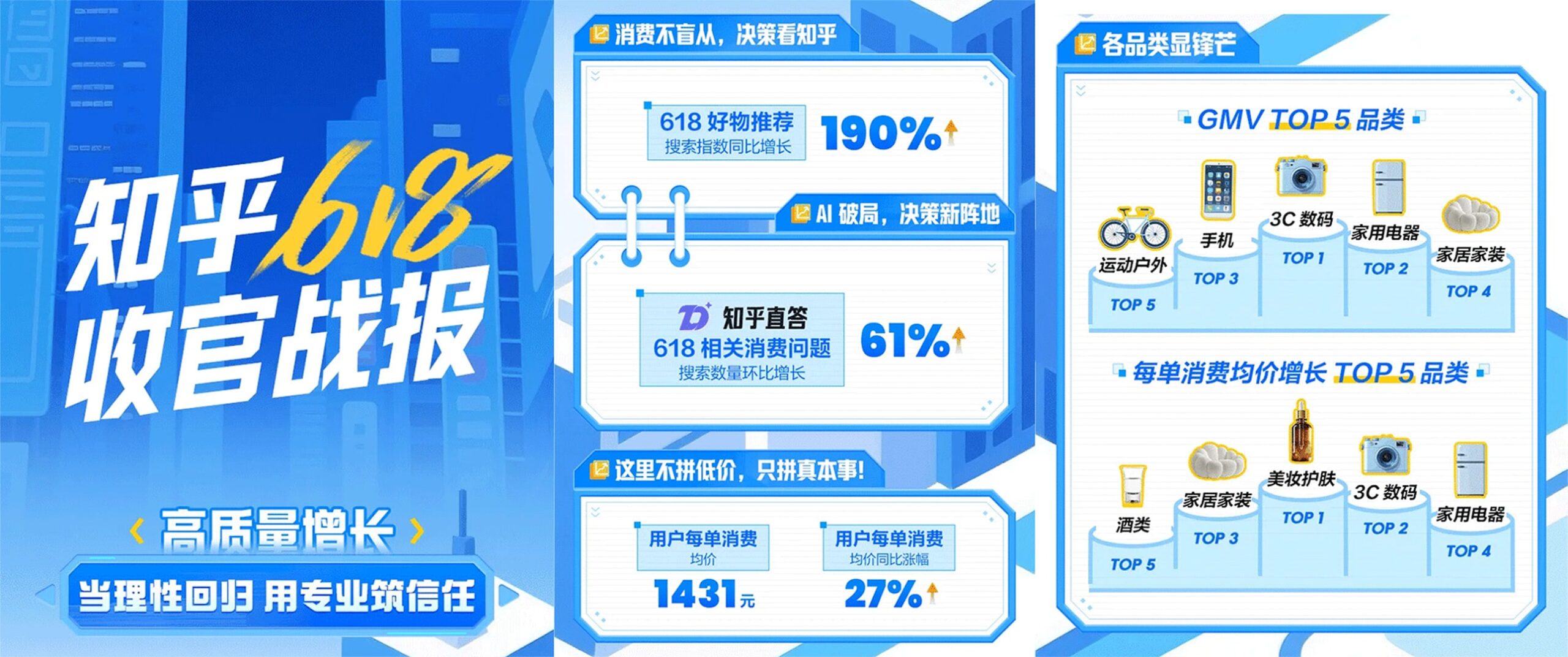
Being human-first in the AI era
KrASIA: The industry is buzzing about AI-driven chat interfaces, but Zhihu continues to prioritize human voices. Isn’t that counterintuitive?
ZY: Our principle is that AI should serve people, not replace them. AI can generate content, but it cannot replicate lived experience or judgment.
Take China’s first atomic bomb project. Only a 95-year-old participant can recount the details. Or when Elon Musk posts on X, AI can summarize it, but it cannot reconstruct his thought process. Those are uniquely human contributions.
We embrace AI with two commitments. First, all AI-generated content must be labeled and never presented as human-made. Second, AI should empower creators by handling tasks like fact-checking or visualization, allowing them to focus on deeper thinking.
We will also not allow AI to flatten discussions or homogenize discourse. Inspiration comes from human exchange.
KrASIA: How do you see information tools evolving in the AI era?
ZY: The internet never has a final medium, only evolving ones. AI dissolves media boundaries: text, images, and video can transform seamlessly into one another. A research paper could instantly become a video explainer, while a conversation could be distilled into structured notes.
The shift will move from efficiency to alignment with human needs. Speed without regard for perception or context is meaningless. The future lies in tools that capture insights from conversations, add references, and help solve real problems.
In three to five years, I want Zhihu to serve as “information and trust infrastructure.” Not just a place to find answers, but a medium where credibility is embedded and users can quickly gauge reliability. That is the foundation we aim to build in the AI era.
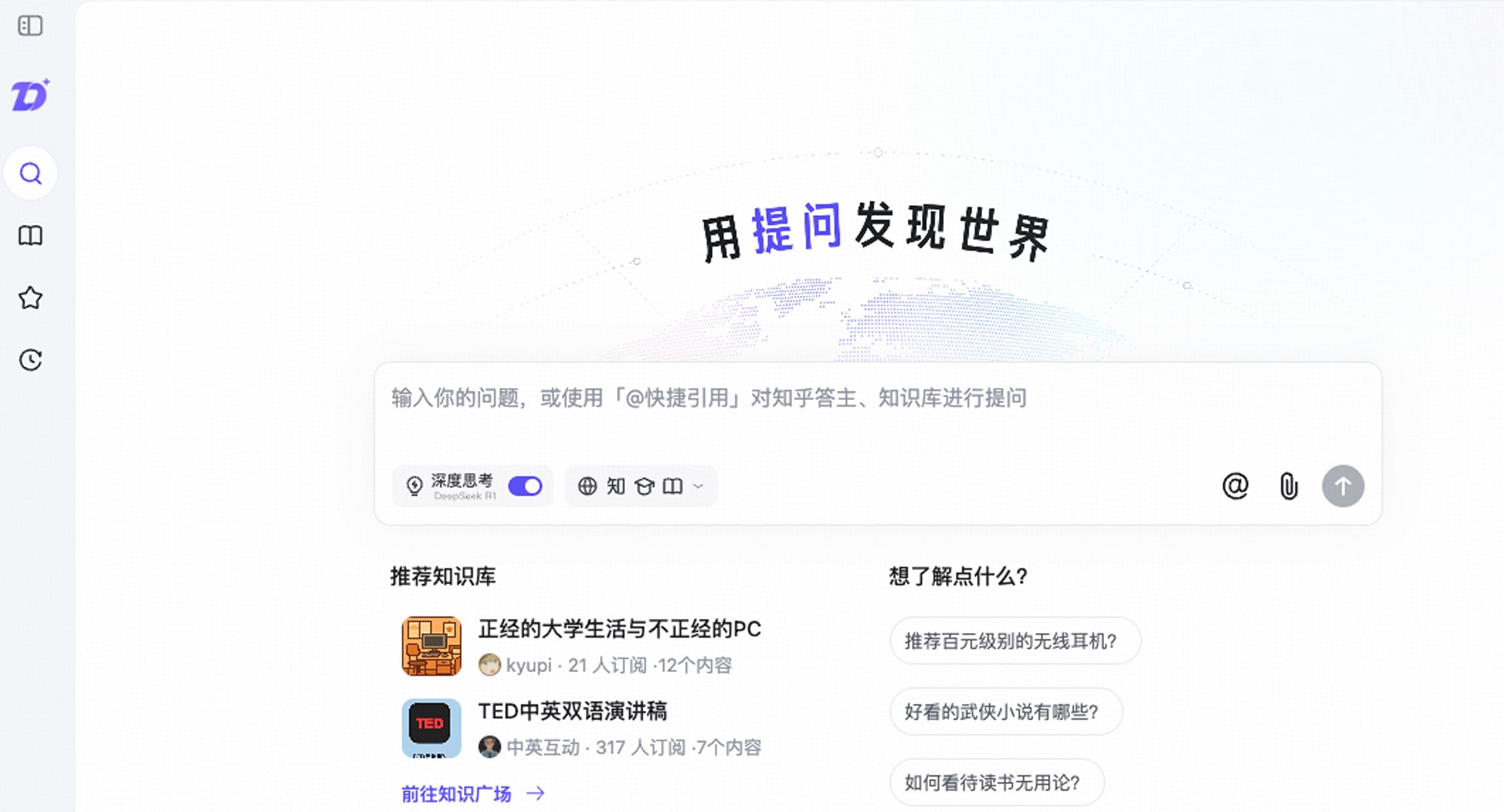
KrASIA: And how do you plan to make that happen?
ZY: Three steps.
First, enhance AI-powered search by combining retrieval techniques with deeper interpretation.
Second, build a multi-format knowledge base that supports text, audio, and video.
Third, roll out features that integrate AI-driven tools directly into the community, expected by the end of this year.
Stay tuned.
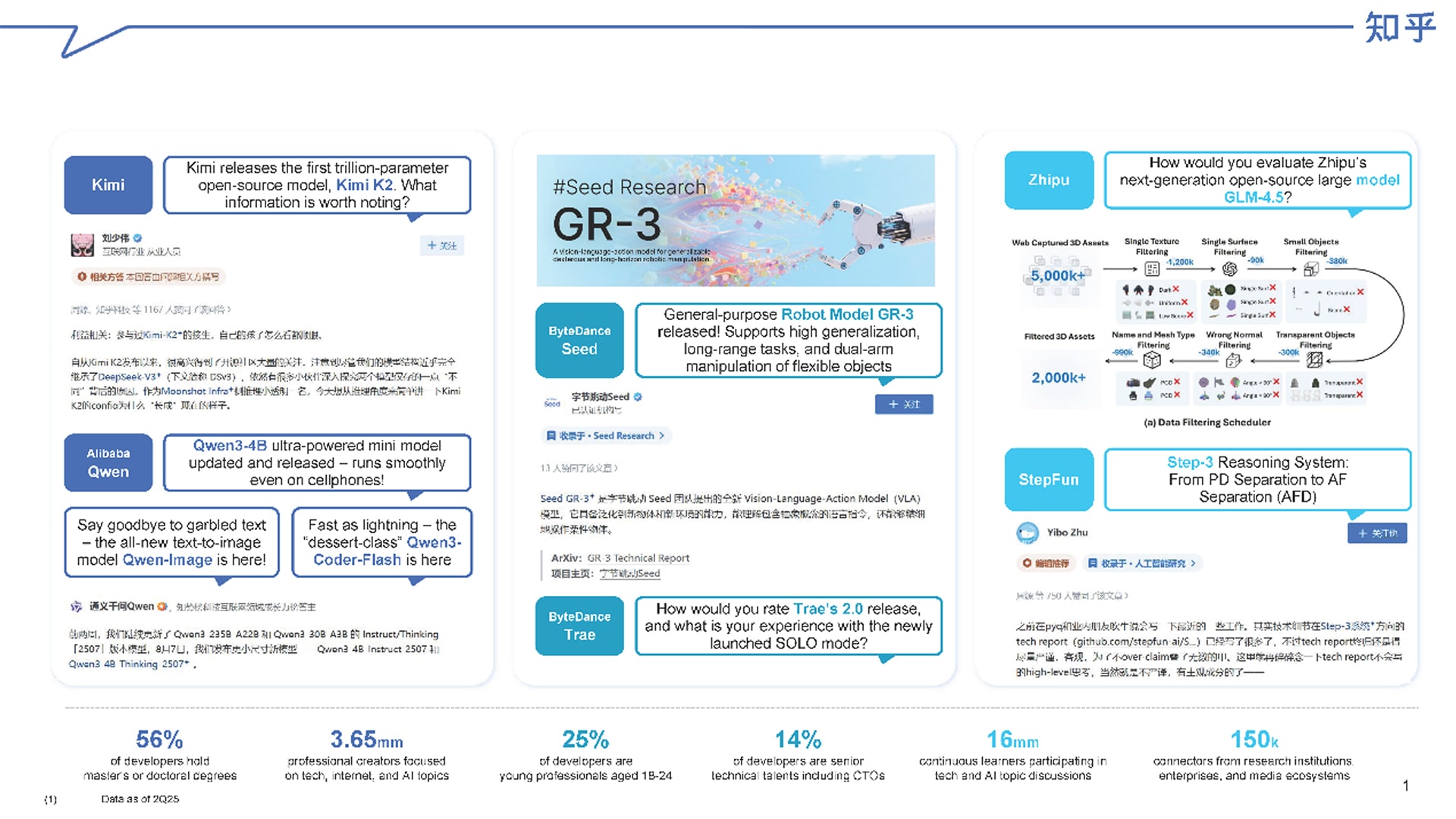
This article was published in partnership with Zhihu.
